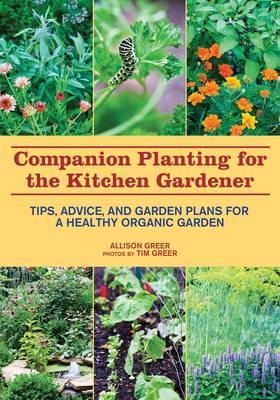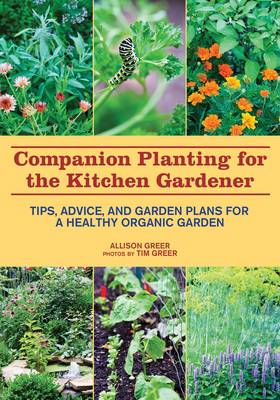
Bedankt voor het vertrouwen het afgelopen jaar! Om jou te bedanken bieden we GRATIS verzending aan op alles gedurende de hele maand januari.
- Afhalen na 1 uur in een winkel met voorraad
- Gratis thuislevering in België
- Ruim aanbod met 7 miljoen producten
Bedankt voor het vertrouwen het afgelopen jaar! Om jou te bedanken bieden we GRATIS verzending aan op alles gedurende de hele maand januari.
- Afhalen na 1 uur in een winkel met voorraad
- Gratis thuislevering in België
- Ruim aanbod met 7 miljoen producten
Zoeken
Omschrijving
Starting with the basics of organic gardening, such as how to prepare soil and the importance of cover crops and organic fertilizer, here--in full-color--are the principles of companion planting, how plants interact, and how to cultivate a healthy garden. Companion planting techniques have been used for centuries to facilitate better, more nutritious, and more abundant crops. Did you know:
It's a lot to think about, but there's no reason to feel overwhelmed. With Companion Planting for the Kitchen Gardener, you'll have all the information you need in clear, concise terms and with charts and garden plans you can copy or modify to suit your family's needs. There is an entire chapter devoted to each of the fifteen most popular vegetables, with charts, diagrams, and descriptions of each--a treasure for gardeners with busy lives who want an easy reference guide for planning their ideal kitchen garden. Full of gorgeous, full-color photographs and easy-to-follow diagrams, this is a beautiful, useful guide for the home organic gardener.
- Beets will grow better if surrounded by mint or garlic,
- Tomatoes should not be planted near cabbage
- Flax helps protect some root vegetables from pests
- Tomatoes will thrive when planted near carrots (though the carrots may be stunted).
- Celery will be happier if it's far away from corn
- Broccoli and dill make a terrific garden pair.
It's a lot to think about, but there's no reason to feel overwhelmed. With Companion Planting for the Kitchen Gardener, you'll have all the information you need in clear, concise terms and with charts and garden plans you can copy or modify to suit your family's needs. There is an entire chapter devoted to each of the fifteen most popular vegetables, with charts, diagrams, and descriptions of each--a treasure for gardeners with busy lives who want an easy reference guide for planning their ideal kitchen garden. Full of gorgeous, full-color photographs and easy-to-follow diagrams, this is a beautiful, useful guide for the home organic gardener.
Specificaties
Betrokkenen
- Auteur(s):
- Uitgeverij:
Inhoud
- Aantal bladzijden:
- 240
- Taal:
- Engels
Eigenschappen
- Productcode (EAN):
- 9781629141718
- Verschijningsdatum:
- 15/07/2014
- Uitvoering:
- Paperback
- Formaat:
- Trade paperback (VS)
- Afmetingen:
- 178 mm x 251 mm
- Gewicht:
- 1038 g

Alleen bij Standaard Boekhandel
+ 30 punten op je klantenkaart van Standaard Boekhandel
Beoordelingen
We publiceren alleen reviews die voldoen aan de voorwaarden voor reviews. Bekijk onze voorwaarden voor reviews.












